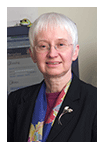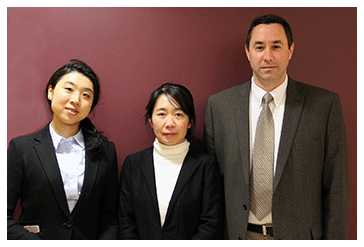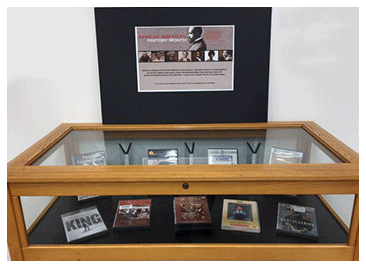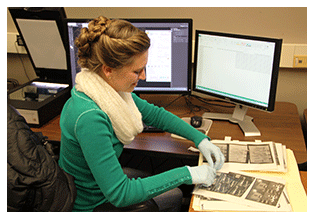 The who, what, why, when, where and how of the Libraries Bravo Awards The who, what, why, when, where and how of the Libraries Bravo Awards
Deadline for nominations: February 29, 2016
What is the Libraries Bravo Award?
The Libraries program follows University guidelines in making awards to individual Libraries employees to recognize a significant one-time contribution to the University's or the Libraries’ mission or goals. Nominations must include a description which links the accomplishment to one or more of the following award categories: Moving the University/Libraries Forward; Operational Excellence; Innovation/Creativity; Fiscal Stewardship.
How is the Libraries Bravo Award different from the awards already given in Libraries (Moriarty, Dagnese and Dean’s awards)?
The main differences are as follows:
A Libraries Bravo Award recognizes a significant one-time contribution to the University’s or Libraries mission or goals, occurring within a specific time period and clearly and significantly going beyond the requirements of the individual’s job. The Dagnese and Moriarty awards recognize contributions that may take place over an extended period of time and are closely related to the requirements of the individual’s job. The Dean’s Awards (individual and team) recognize outstanding contributions in support of strategic initiatives during longer time periods.
What are the criteria for the Libraries Bravo Awards?
Libraries Bravo Awards may be provided to eligible individuals who make significant one-time contributions to the University's or the Libraries’ mission or goals. Awards are tied to a specific message of recognition for a concrete or measurable goal, achievement or contribution which fits within one or more of the award categories set forth by the University:
Moving the University Forward
Accomplishments or contributions that transform or advance University objectives (i.e., initiatives that improve graduation rates, development of programs to measure student academic knowledge, enhancing the academic excellence of the University, improving student affordability, etc.).
Operational Excellence
Extraordinary effort during times of critical department need (e.g., contribution that clearly and significantly exceeds standard job requirements and impacts the accomplishments of important and critical business operational goals and deliverables or extraordinary performance that far exceeds expected or required performance. Managers must be able to document specific achievements and/or measurable contributions to the unit’s business based upon the employee’s exceptional performance.).
Innovation/Creativity
Innovative work or suggestions, well beyond standard job requirements, that significantly improve operational efficiencies, introduce a new or modified business practice or improve work process, workflow or customer service.
Fiscal Stewardship
Significant cost saving or cost avoidance realized beyond normally expected or established standards.
What is the time period during which the accomplishment must have taken place?
May 2, 2015 through November 30, 2015. The nomination must include a statement of the time frame in which the accomplishment occurred.
What if the work toward the accomplishment began earlier than this time period?
If the accomplishment was completed and/or a significant result occurred during the period May 2, 2015, through November 30, 2015, this will be taken into consideration in evaluating the nomination.
Who is eligible to receive an award?
Regular Libraries employees (i.e., not undergraduate student workers or graduate students) who have completed at least three months of service, have no outstanding disciplinary action, and are employed when the award is paid in the final week of April 2016. Exceptions: The dean, associate deans, directors reporting directly to the dean and serving on Dean’s Council, division heads are not eligible for the awards, nor are members of the Bravo Awards Committee during their service on the committee. Teams are not eligible.
Who can nominate a Libraries employee for an award?
Libraries regular employees may make nominations.
Can I nominate myself?
Yes, self-nominations are accepted.
Can I nominate a team?
No, teams are not eligible for Libraries Bravo Awards.
Who decides which nominees will receive an award and the amount of the reward?
The Dean of Libraries appoints a Bravo Awards Committee (BAC) to review nominations and to advise on awards with the membership composed of the chairs of the Libraries Clerical Service Advisory Committee (LCSSAC), the Libraries Administrative Professional Advisory Committee (LAPSAC), and the Libraries Faculty Affairs Committee (FAC); and the Associate Dean for Planning and Administration, who chairs the committee. Present members are Dianna Deputy, Amy Winks, Vicki Killion and Nancy Hewison. The Libraries Bravo Awards Committee reviews nominations, including supervisors’ statements explaining why the nomination merits an award, and makes recommendations to the Dean of Libraries. The Dean makes the final decision to grant an award and decides on the amount of the award.
Where can I get more information? The following questions are answered in an expanded version of this article, which you will find on the Libraries Awards page of the intranet:
- What steps do I need to take to nominate someone for an award?
- What do I, as a supervisor, need to do when I receive a Bravo Award nomination form for an employee who reports directly to me?
- Why did the University develop the Bravo Award?
- Who provides the funding for Bravo Awards?
- If I’m given a Libraries Bravo Award, how will I receive the monetary award?
Who can I ask if I have questions about the Libraries Bravo Award, including the nomination and supervisor steps?
Please contact Nancy Hewison, associate dean for planning and administration, nhewison@purdue.edu. |

 Get out your party hats. It’s time to celebrate fair use. The week of February 22-26 is Fair Use Week. This is an annual event coordinated by the Association of Research Libraries that highlights the incredible impact and benefits of fair use that we enjoy all year long.
Get out your party hats. It’s time to celebrate fair use. The week of February 22-26 is Fair Use Week. This is an annual event coordinated by the Association of Research Libraries that highlights the incredible impact and benefits of fair use that we enjoy all year long. The who, what, why, when, where and how of the Libraries Bravo Awards
The who, what, why, when, where and how of the Libraries Bravo Awards On Friday, February 5, the Distributed Data Curation Center and Purdue Libraries hosted two visiting librarians from Kyoto University, Ms. Eriko Ono and Ms. Michiyo Yasuhara. With the upcoming Research Data Alliance (RDA) plenary meeting in Tokyo at the end of February, interest in research data management and library services is building in Japan.
On Friday, February 5, the Distributed Data Curation Center and Purdue Libraries hosted two visiting librarians from Kyoto University, Ms. Eriko Ono and Ms. Michiyo Yasuhara. With the upcoming Research Data Alliance (RDA) plenary meeting in Tokyo at the end of February, interest in research data management and library services is building in Japan.  Dale White started working in Auxiliary Services on July 16, 2001 and retired in July 2015. During his time at Purdue Libraries he was involved with many projects including renovations of HSSE, Archives and Special Collections, Parrish, Hicks, IMPACT classrooms, Vet Med and STEW 279. He was also instrumental in the installation of the HSSE, Rawls and Lynn repositories and many other projects that included the installation of fire alarms and sprinkler systems. Dale is remembered for his knack of acquiring used furniture, equipment and space from other departments around campus. He did all this while dealing with the everyday squeaky hinges and a multitude of other projects that may have popped up along the way. In one way or another Dale touched the life of almost every staff member and has left many lasting imprints in Purdue Libraries’ legacy.
Dale White started working in Auxiliary Services on July 16, 2001 and retired in July 2015. During his time at Purdue Libraries he was involved with many projects including renovations of HSSE, Archives and Special Collections, Parrish, Hicks, IMPACT classrooms, Vet Med and STEW 279. He was also instrumental in the installation of the HSSE, Rawls and Lynn repositories and many other projects that included the installation of fire alarms and sprinkler systems. Dale is remembered for his knack of acquiring used furniture, equipment and space from other departments around campus. He did all this while dealing with the everyday squeaky hinges and a multitude of other projects that may have popped up along the way. In one way or another Dale touched the life of almost every staff member and has left many lasting imprints in Purdue Libraries’ legacy. Will Ferrall
Will Ferrall Purdue University Libraries is recognizing Black History Month with the following displays and ongoing available digital resources:
Purdue University Libraries is recognizing Black History Month with the following displays and ongoing available digital resources:




